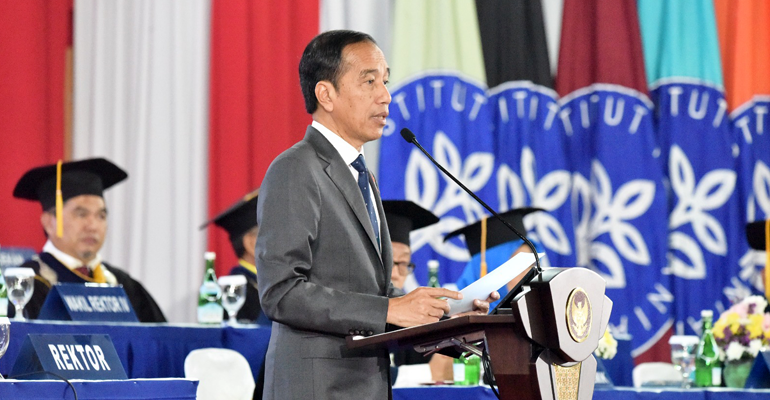Presenting an Oration at IPB University, President Jokowi Asked Minister of Agriculture to Share IPB University’s Rice and Chilli Innovations to the Society

The President of the Republic of Indonesia, Joko Widodo, asked the Minister of Agriculture, Syahrul Yasin Limpo, to use several innovations of IPB University, such as IPB3S rice that can produce 12 tonnes per hectare and various varieties of chilies to be distributed to the citizens, especially farmers. The statement was conveyed directly in the oration of the Open Session in the framework of the 60th Anniversary of IPB University, on Friday (15/9) at Grha Widya Wisuda, Dramaga Campus.
“For me, IPB University is very special. Extraordinary, the red chilies are so big. There is rice that is special for barren land, rice that produces 12 tonnes per hectare, and seaweed salt. There are various kinds, with very modern packaging, the brand looks very well handled with a very good marketing touch,” he said appreciating the results of IPB University’s innovation work.
“Mr Minister of Agriculture, take the enormous rice and chilies and give them to the farmers as much as possible,” Jokowi added.
Seeing a number of innovations that have been produced by IPB University in the midst of the challenges and threats of the world food crisis, Jokowi believes that IPB University can solve this problem. “Well, this is IPB University’s job, Mr Rector. This food matter has been handed over to IPB University. Inshallah it will be completed, I’m waiting,” said the President, greeted by the applause of IPB University residents who were present.
Jokowi further said that currently Indonesia needs massive innovation that can be a breakthrough and solution in answering existing challenges. According to him, a number of challenges and problems of the existing crisis should be an opportunity for Indonesia to become the world’s food barn.
In addition, Jokowi also approved the concept of sustainable and inclusive agromaritime developed by IPB University. “This can be an important part of our food innovation ecosystem. However, these efforts cannot be completed by one discipline, but must be transdisciplinary,” he said. Therefore, he also welcomed the expansion of disciplines carried out by IPB University.
Previously, the Rector of IPB University, Prof Arif Satria gave an explanation of the public’s questions regarding IPB University’s contribution to national agriculture and food. Rector said, until now IPB University has produced 116 superior varieties.
“There are varieties of IPB 11S, IPB 9G, IPB 10G, sorghum varieties Sorice, Marigold and others. IPB 3S rice has been applied in 26 provinces in Indonesia. IPB University also has Callina papaya which is exported to 11 countries, PK-1 pineapple to three countries and soybean cultivation technology with productivity reaching 4.63 tonnes/ha,” he explained.
IPB University has developed a number of food diversification products, such as rice from corn, rice from seaweed and rice from sorghum for import substitution. There are also non-wheat noodles. Superior seeds of IPB D1-D4 chicken and strong catfish have also been present.
Previously, Rector also mentioned that almost 70 per cent of IPB University alumni are engaged in the agricultural sector in a broad sense. “This means that IPB University is still istiqomah in its field,” he said.
In the moment of the Open Session of the President of the Republic of Indonesia at the 60th Anniversary of IPB University, a number of Ministers of the Advanced Indonesia Cabinet were also present, namely Nadiem Anwar Makarim (Minister of Education, Culture, Research, and Technology), Syahrul Yasin Limpo (Minister of Agriculture), Siti Nurbaya Abu Bakar (Minister of Environment and Forestry), Teten Masduki (Minister of Cooperatives and Small and Medium Enterprises), Ida Fauziyah (Minister of Manpower) and Bahlil Lahadalia (Minister of Investment). (dh/Rz) (IAAS/RUM)



